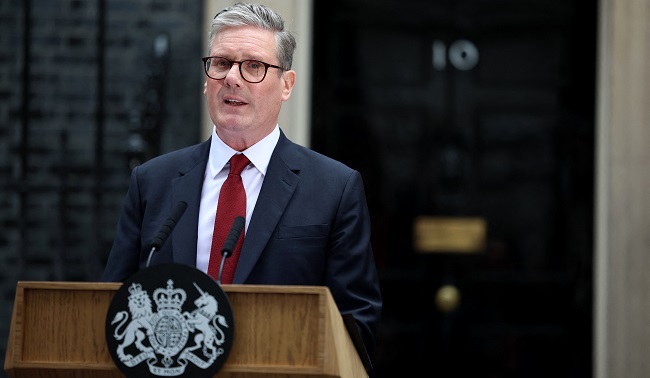The prime minister has urged British nationals in Lebanon to “leave immediately” as fighting between Israel and Hezbollah, the Iran-backed militant group dominating the country, has intensified.
Sir Keir Starmer stated, “We are ramping up contingency plans, which is expected given the escalation,” and warned that “we are potentially on the brink” of a full-scale war.
The Ministry of Defence (MoD) is deploying 700 troops to nearby Cyprus in preparation for a possible evacuation of British nationals from Lebanon, and the government continues to advise against all travel to the country.
The situation in Lebanon, where Israeli strikes reportedly killed over 560 people this week, is described as “rapidly deteriorating, with devastating consequences.”
Lebanon’s health minister told the BBC that the situation in the country is “carnage,” with hospitals overwhelmed by casualties from two days of extensive Israeli airstrikes targeting Hezbollah.
When asked how the prime minister would prevent a repeat of the chaos seen in Kabul during the Taliban’s takeover in August 2021, Sir Keir emphasized, “The most important message for British nationals in Lebanon is to leave immediately.”
“It is important that we’ve been really, really clear: now is the time to leave.”
The Afghan evacuation, which saw 15,000 people airlifted out, was widely criticized for being chaotic and poorly managed.
Currently, an estimated 10,000 UK citizens are in Lebanon. A senior government source noted that, unlike Afghanistan, commercial flights are still available from Lebanon, and British nationals are urged to book seats on these flights.
US citizens have also been advised to leave, with the US Embassy in Lebanon warning that most airlines have suspended or cancelled flights, leaving many fully booked. The embassy urged people to secure any available ticket.
The 700 British troops deployed to Cyprus will join 500 military personnel who were stationed there earlier as part of the Ministry of Defence’s contingency plans for evacuation.
Two British warships are already in the region, with Royal Air Force planes and helicopters on standby.
When asked on BBC Radio 4’s Today programme whether he sensed the world was on the brink of a wider war in the Middle East, Sir Keir expressed his deep concern, stating, “We are potentially at a brink point, and we have to come back from the edge.”
He reiterated his call, along with other ministers, for an immediate ceasefire and de-escalation.
Defence Secretary John Healey said: “We continue to urge all sides to step back from conflict to prevent further tragic loss of life.
“Our government is ensuring all preparations are in place to support British nationals should the situation deteriorate.
“I want to thank the British personnel who are deploying in the region for their commitment and professionalism.”
Healey convened a meeting with fellow ministers, intelligence chiefs, and diplomats on Tuesday afternoon to review the government’s plans.
Officials have indicated that the UK maintains a substantial diplomatic and military presence near Lebanon, including RAF Akrotiri in Cyprus and two Royal Navy vessels, RFA Mounts Bay and HMS Duncan, which have been stationed in the eastern Mediterranean throughout the summer.
The Royal Air Force also has aircraft and helicopters on standby.
The escalating conflict in the Middle East is expected to be a key issue for the prime minister and other world leaders during discussions at the UN General Assembly in New York.
Sir Keir arrived in the city on Tuesday evening, local time.
Tensions have been rising across the Middle East since Hamas militants attacked Israel on October 7 last year, resulting in the deaths of about 1,200 people and the capture of 251 hostages.
In response to the Hamas attack, Israel’s military campaign in Gaza has claimed over 41,000 lives, according to the Hamas-run health ministry.
Previously sporadic clashes between Israel and Hezbollah intensified on October 8, one day after the Hamas assault. Hezbollah launched attacks on Israeli positions in solidarity with Hamas.
Hezbollah has fired over 8,000 rockets into northern Israel and the Israeli-occupied Golan Heights. It has also targeted military vehicles with anti-tank missiles and deployed explosive drones against military objectives.
Last week, Hezbollah’s communication devices began exploding throughout Lebanon.
In retaliation, Israel carried out a significant wave of airstrikes on Monday, reportedly killing 560 people, according to the Lebanese government.
Last year, the British government played a role in coordinating the evacuation of British nationals from Gaza, with around 200 UK citizens believed to have been residing there prior to the outbreak of the conflict.



